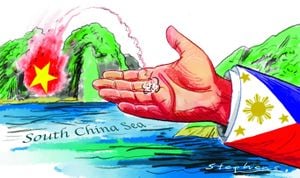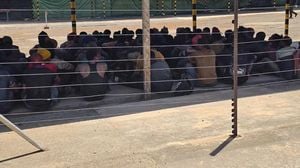Violence has escalated dramatically across Manipur, prompting civil society organizations to take firm action and demand immediate governmental intervention. Over the past few weeks, conflict between armed groups and civilians has created havoc, leading to widespread protests and shutdowns.
On November 13, life came to a standstill as the coalition of 13 Civil Society Organizations (CSOs) called for a 24-hour shutdown across Manipur. This courageous act was primarily aimed at protesting the state authorities' failure to address rising violence and insecurity within the region. Markets, schools, and government offices closed their doors as communities joined forces, highlighting their demands for change.
Representatives from the coalition, vocal leaders like Nahakpam Santa, expressed grave concern over the government’s perceived negligence to provide protection for the indigenous Meitei community, who have increasingly fallen victim to aggressive attacks by armed militants. Santa insisted the state must draft and present a clear plan to restore peace within just 24 hours, otherwise, they would escalate their protests.
The situation reached its boiling point following violent incidents, especially one tragic event on November 9 where Sapam Sophia, a mother of three, was brutally attacked. Civil society groups are now seeking justice for her untimely death amid rampant violence. The coalition has also urged the government to locate six individuals, including children, who were reportedly kidnapped by armed militants. If these demands continue to go ignored, they have vowed to organize larger-scale public protests.
The unrest within Manipur has intensified following confrontations between armed militants and the Central Reserve Police Force (CRPF) earlier this week. Incidents like these have pushed the state’s police forces to break their usual restraint and respond with heightened force due to the increasing severity of armed attacks. Reports indicate several militants were neutralized during one such clash, but the feeling of safety remains elusive for many locals.
Adding to the civil unrest, thirteen civil society organizations have submitted formal petitions to both the governor and chief minister, urging immediate intervention to address the deteriorated security situation. They expressed deep concern over the attacks on Meitei villages by Kuki militants—designated by many as narco-terrorists—who have increasingly brazened their offensive actions since the conflict began earlier this year. The groups have been encountering military resistance at local police stations where they have burned shops and attacked security personnel.
The blockades on national highways have starkly worsened living conditions for many. These roads are literal lifelines to 3.5 million people, yet the state has failed to provide adequate security measures to allow residents free passage. A series of ceasefires have also been violated, undermining public trust between the communities and governmental authorities.
Incidents like the attacks on the Meitei village of Jakuradhor have raised alarms about rampant violence and insecurity affecting ordinary citizens. Reports of killings, abductions, and home burnings have left communities feeling vulnerable and mistrustful of law enforcement. One case involved the abduction of six villagers, including children, which has thrust the community’s safety concerns to the forefront.
The Federation of Civil Society Organizations (FOCS) has openly called out the perpetrators of this violence, demanding accountability and condemning the actions of the armed groups. The federation insists it is imperative for all stakeholders—civil society groups, governmental agencies, and the general populace—to unite against this rising tide of violence.
Institutions like the International Peace and Social Advancement Coalition and Indigenous People’s Association of Kangleipak have echoed these sentiments, pushing for the state and central governments to enact reforms. The general atmosphere reveals growing frustration with what many perceive as the state’s inability to protect its citizens, especially as incidents of violence proliferate without consequence.
Discontent with national political parties has also surfaced, as residents feel their security concerns have been largely ignored. Frustrated by the lack of support, civil society organizations are now discussing steps to withdraw support altogether from national parties who they believe have failed them. This sentiment is gaining traction as Manipur experiences first-hand how its citizens have become collateral damage within larger political games—where party allegiances overshadow public service responsibilities.
Right now, civil organizations are adamant: if their demands aren’t formally responded to within seven days, they pledge to launch collective actions, including suspending support for all politicians, regardless of affiliation. Their demands include securing national highways, implementing protective measures for vulnerable communities, and facilitating the safe return of hostages.
The situation continues to evolve, as civil unrest remains palpable among the local populace. Unique actions have even emerged, such as measures encouraging silence or symbolic gatherings to highlight the community's grief and frustration over their unsafe realities. Community leaders like FOCS already plan to rally stakeholders to encourage dialogue and cooperation, stressing shared accountability toward restoring peace.
To add to this tumultuous backdrop, the territorial dynamics of Manipur's ethnic communities compound the challenges. Misunderstandings, tribal tensions, and long-standing grievances require immediate resolution to promote harmony. The timeline is tight, as civil leaders urge swift governmental response to restore order, heal community rifts, and facilitate the much-anticipated peace.
Electrical stores and roadside vendors report drastic impacts from the continued instability, as both customers and employees lack the confidence to be out and about, especially during curfew hours. Trust erodes as community wounds deepen with each violent encounter. Ensuring safety for civilians—as well as hosts seeking refuge from civil unrest—became evident needs during recent upheavals.
Lastly, as calls for unity rise, locals are hopeful for clarification and comprehensive strategies from their leaders, emphasizing the necessity for collaborative efforts to forge lasting resolutions. The commitment from civil society to hold leaders accountable may either lead to unprecedented political shifts or increase tension, depending on how well responses are received.



